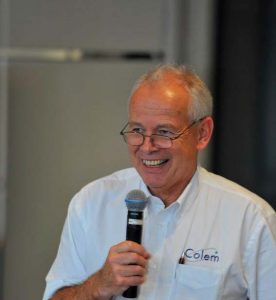
The Satellite Interference Reduction Group (IRG) recently established a new working group to combat the challenging issue of intentional interference. Martin Coleman gives us a glimpse into the challenges of devising technology to tackle intentional interference.
As with all interference, technology is key…using better predictive techniques will help; for example, keeping an eye on the politics involved around certain broadcasts and being ready with pre-set geolocation systems
Over recent years we have spent a lot of time discussing the issue of satellite interference. However, we should remember that satellite is an extremely resilient solution, which is used in a wide range of applications and situations, many of which simply couldn’t be possible without satellite technology. Just look at Hurricane Sandy where satellite was the only communication service fully operational both during and after the hurricane.
Interference is a problem in our industry, but in actual fact only a minimal number of services are affected. That said, we as an industry are striving for perfection and we are working hard to ensure no services are affected by interference, whatever the cause. Intentional interference is one part of the puzzle, but it is that piece of the sky where you observe a sea of blue and can’t quite work out where it fits!
Technology, Technology, Technology
As with all interference, technology is key. Intentional interference is a specific case of the difficult cases our industry faces from time-to-time. In order to be successful, we need to improve our techniques, trying to be one step ahead and be ready to resolve the interference before it happens. Using better predictive techniques will help; for example, keeping an eye on the politics involved around certain broadcasts and being ready with pre-set geolocation systems.
Indeed, geolocation is an extremely valuable tool in our toolkit, enabling operators to locate the source of all types of interference. By improving geolocation technologies, we can locate the source much more efficiently, as well as becoming more accurate, helping us to pinpoint a much more precise location.
There is also a need to improve and standardise our geolocation procedures, data gathering and reporting, for all types of geo-located interference. The better records we keep and with a common format the more we can understand it and spot the patterns that will enable us to resolve it more easily and improve our predictive techniques of when it may reoccur.
In addition, we need to investigate the need for coordinated reference monitoring for such incidents through registered earth stations, for example, via the ITU but also include both satellite operator and private company facilities such that a “three way, root cause analysis” can be achieved efficiently but in a cost effective manner. In addition, competent proof of the interference location needs to be added with standardised sets of results that both national entities and the ITU can thus use to present that evidence formally.
Collaboration
One thing that is clear; we can’t do this alone. As with all interference initiatives, it relies on the support and collaboration of the entire industry. However, by pooling resources to develop practical initiatives to gather evidence, we can begin to better combat all difficult cases of interference.
That work is already under way, with many organisations working closely together to feed information and improve the resolution of interference. IRG will be moderating a panel on intentional interference, which will discuss the technology enhancements needed to resolve this issue. The session takes place at 1pm on May 8, 2013, at MilSatCom Middle East.
[boxposthighlight]Global Space & Satellite Forum
More than 400 experts are expected to converge in Abu Dhabi for the Global Space & Satellite Forum, from 7-8 May 2013 at the Ritz Carlton Grand Canal.
The fourth edition of the forum is co-located with the Milsatcom Middle East conference, featuring speakers from the UAE Armed Forces, and Ministry of Defence and Aviation Saudi Arabia. International speakers include those from the Ministry of Defence in the UK, US Department of State and Canadian Armed Forces.
IRG will be moderating a panel on intentional interference, which will discuss the technology enhancements needed to resolve this issue. The session takes place at 1pm on May 8, 2013, at MilSatCom Middle East.
[/boxposthighlight]














Add Comment